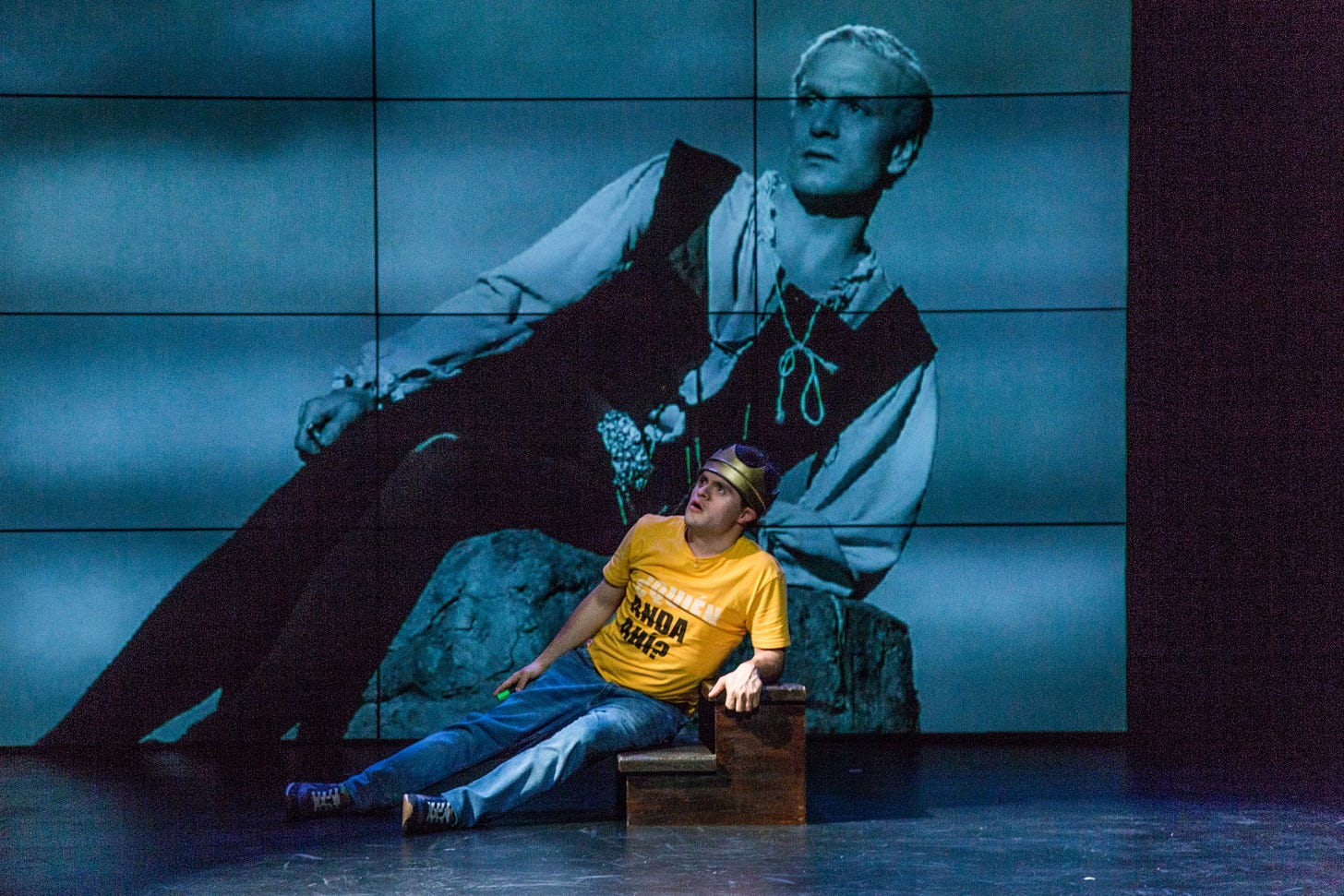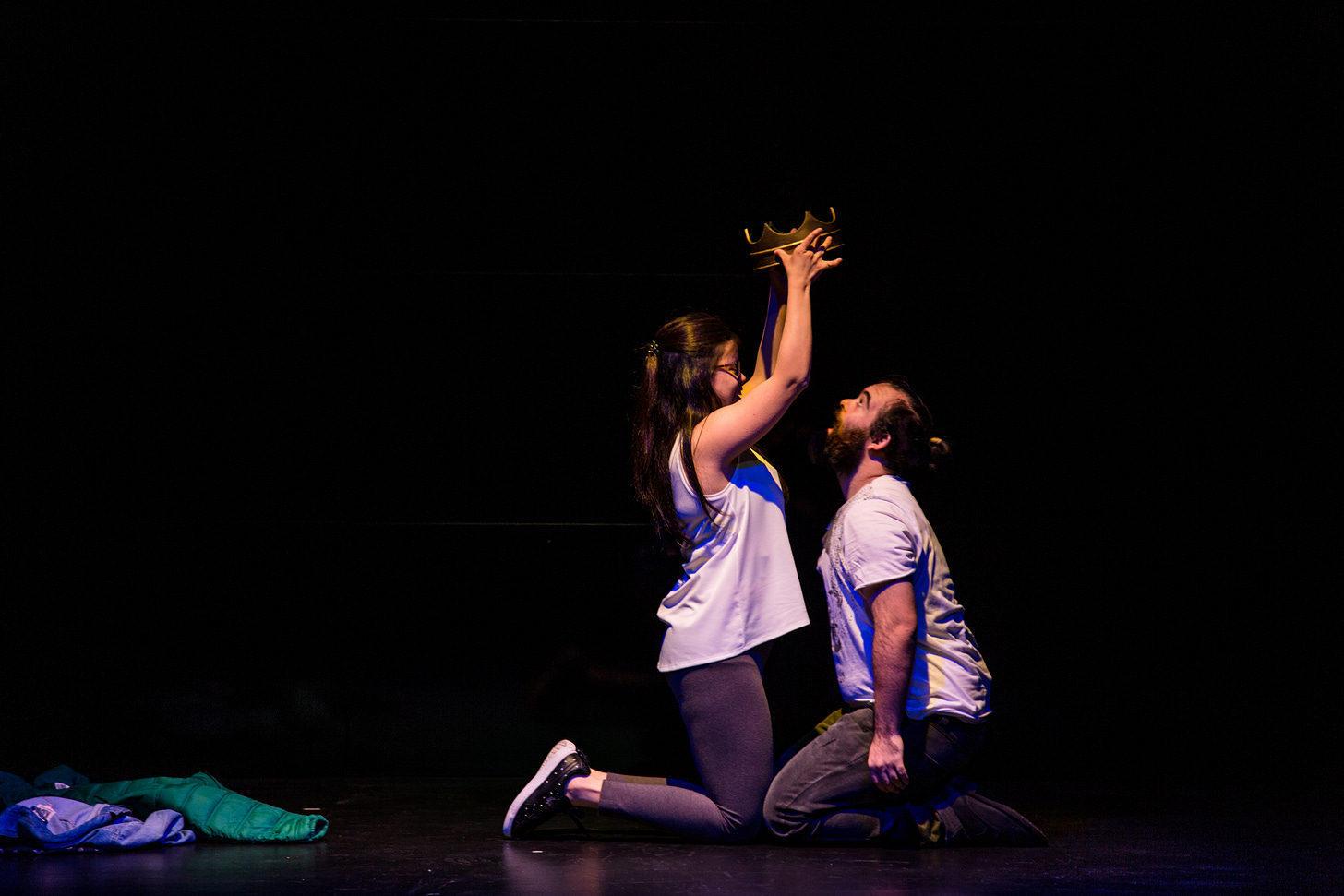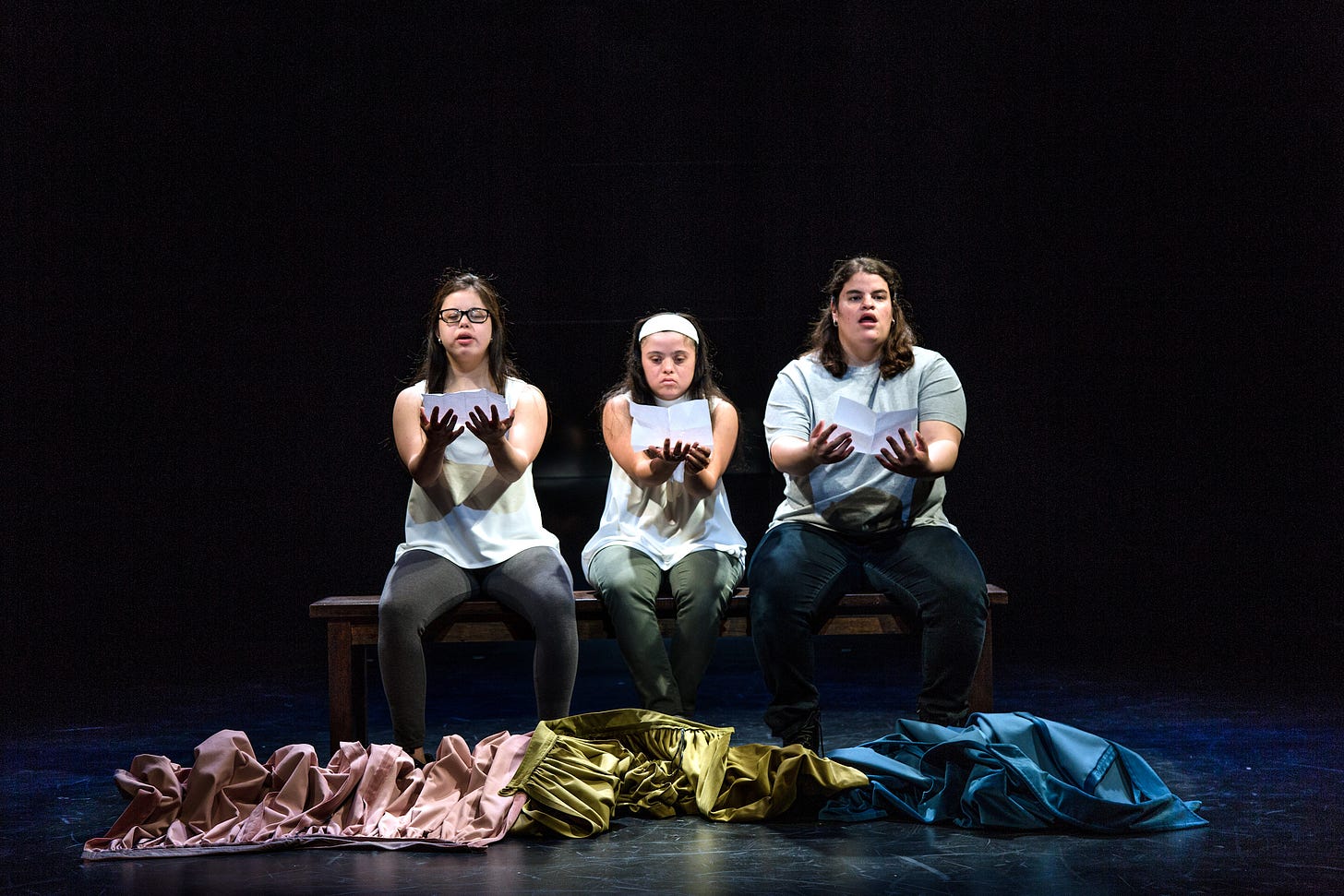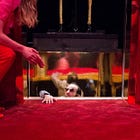Democratising Shakespeare: Teatro La Plaza's Hamlet
On a unique Peruvian production and how it reframes Shakespeare's play.
Hello, I’m writing this from London - Croydon to be specific - though this week’s edition is actually about a radically democratic production of Hamlet I saw in Edinburgh last year by the Peruvian company Teatro La Plaza. I know Peru isn’t Europe but they’ve toured widely and UK audiences get a chance to catch it at the Barbican at the end of the month, plus the show is amazing and I wanted to learn more about how it was made.
Here’s the nakedly transactional bit. This news letter is a pleasure to write, but it takes time. So if you want to support my writing while helping keep this Substack largely paywall-free (though there will be occasional paid subscriber bonus posts, like this one on Robert Lepage’s Faith, Money, War and Love), you - or your institution - can do so for just £5 a month or £50 a year. Or just share this newsletter with someone you think might find it interesting. That helps too.
One of the best things I saw in Edinburgh last year – possibly one of the best things I saw all year – was a production of Hamlet by the Peruvian company Teatro La Plaza. (Here’s my review in The Stage and here’s me continuing to gush about it in my round-up of my favourite shows I saw last year).
Hamlet is a mountain of a role, a test of any actor. In Teatro La Plaza’s production every member of the cast, all of whom have Down syndrome, gets to play the Dane, making for a performance that is both uniquely democratic and celebratory. It’s a show which gives the actors space to explore how an ableist society sees them and to voice their frustration with the assumptions that are often made about them. It’s also an exercise in ownership, of the stage and of Shakespeare. And, I should add, it’s really great theatre, playful, poignant, inclusive, and joyous. There’s even a cameo from Ian McKellen.
The show is directed by Chela De Ferrari, who founded Teatro La Plaza in Lima in 2003. She had been wanting to direct Hamlet for years but never found the right actor. One of the cast members, Jaime Cruz, who was working at the theatre as an usher at the time, wanted to be a performer, so De Ferrari took him for a coffee. “During that conversation, I saw him—suddenly and clearly—as Hamlet,” she says. “That day, I realized I had been asking the wrong question. The “right actor” wasn’t someone to fit the traditional mould of the role—it was someone who could give the play new meaning.”
“The famous question “to be or not to be” takes on a new urgency when spoken by someone whose very right to be in public, professional, or artistic spaces is often questioned.”
A crucial element of the production is the fact the actors share the role of Hamlet. Everyone gets to wear the crown at some point, which is passed from person to person; everyone gets to explore what it means to them to play Hamlet, ranging from anxiety over line-learning to larger questions about the relationship between the text and their own lived experience.
The choice to share the role transforms the play, says De Ferrari. “The prince’s inner conflict becomes a collective struggle. Each actor brings their own perspective and voice to the character, and suddenly, Hamlet isn’t a single person’s dilemma—it’s a reflection of what it means to exist in a world that may not always see you. For the actors, these are not abstract philosophical questions. They are daily realities.”
They rehearsed the play for a full year. “A rare gift in professional theatre, " says De Ferrari. But for a project like this, it was necessary. “We didn’t begin with a written script—instead, we created it together through exercises, improvisations, writing sessions, and conversations. We explored Shakespeare’s themes—identity, love, power, doubt—and wove them into the actors’ lived experiences. It was a collaborative, horizontal process that moved at a different rhythm—more intuitive, more exploratory.”
“Rather than correcting what might traditionally be seen as ‘flaws’—a pause that goes on too long, a line delivered with unexpected rhythm or pronounced stuttering—we embraced those moments as new ways of representing, seeking through these forms of expression to allow the audience to find beauty where they might not usually see it,” she explains.
The democratic nature of the performance extended into the rehearsal room. “I try to think of the rehearsal room itself as a space where democracy is practiced, one where every participant, regardless of perceived ability, has the power to contribute meaningfully,” she says. “That’s especially important when working with people with cognitive disabilities, who are so often spoken about rather than spoken with. In our process, their ideas, emotions, and rhythms weren’t just included—they shaped the work.”
The deeper they went into rehearsals, the more the cast began to discover parallels between Hamlet and their own lives. The relationship between Ophelia and her father Polonius proved particularly resonant. Manuel García and Ximena Rodríguez perform this scene during the performance.
During rehearsals Garcia decided to draw on advice that his own mother used to give him growing up. “He adopted her tone, her gestures, even her vocabulary. His performance became a tribute to those lessons—but also a re-examination of them,” says De Ferrari. Similarly, Rodríguez, playing Ophelia, “infused her role with memories of her real-life relationship with her father, who is extremely protective of her. She talked about what it’s like to be constantly supervised, to be told what’s best for her, to have her autonomy persistently questioned.”
So, she continues, “when Manuel, as Polonius, gives Ophelia those famous lines of advice, it isn’t just a Shakespearean father lecturing a daughter—it’s a father and daughter in real life navigating the same emotional terrain. The love is there, but so is the tension, the frustration, the longing to be trusted.”
“There were many moments like that throughout the play—instances where the characters’ emotional landscapes mirrored the actors’ own. Again and again, the actors found in Shakespeare echoes of their own struggles, questions, and desires. And that’s what allowed the play to speak not just through them, but with them,” she says.
One way they fostered ownership of the text was by having each actor become a “specialist” in one character. “They researched their chosen figure through personal reflection, drawing, movement, music, and dialogue. They brought those characters to life in their own terms and then offered their discoveries to the group. This allowed each Hamlet, each Ophelia, each Polonius to feel deeply personal filtered through the actor’s own voice, memory, and point of view,” says De Ferrari.
“The existential questions in Hamlet—Who am I? Why am I here? What does it mean to be? —weren’t theoretical for our actors. They’ve lived those questions in a world that often doesn’t give them space to fully exist. When a person with Down syndrome says, “to be or not to be,” it resonates differently because they are speaking from a place where the right to be seen, to be heard, and to be taken seriously is constantly in question.”
Hamlet is a role that, more than most, comes laden with ghosts. To play the role is to become part of a continuum with some of the great actors of the past. Here Susanah Clapp discusses Hamlets through history. There was - understandably - initially some anxiety about taking on the role. “Hamlet has been played by some of the most iconic actors in theatre history. That weight can feel intimidating—especially for actors who have been told all their lives that they don’t belong in those spaces. But we didn’t hide that tension. We included it in the play,” says De Ferrari.
In one of the show’s most potent moments, Cruz attempts to imitate Laurence Olivier’s delivery of Hamlet’s most famous soliloquy, with an image of the actor projected behind him. However, another cast member, Álvaro Toledo, swiftly interrupts him and encourages him not to copy Olivier but to do it in his own way. They’re not here to do Hamlet like Olivier. They’re here to make their own.
“That moment of collective declaration marks a turning point—when the cast fully takes ownership of the story, breaking away from tradition not to reject it, but to reimagine it through their own lens,” says De Ferrari.
Now, says Toledo, “I think taking on the role of Hamlet is something I really enjoy. I like when my character gets upset with Jaime for copying Olivier. Also, when I do the rap because I tell the truth. There are still things we need to work on—we all must keep improving. We are a united family.”
Rodriguez, on the other hand, felt no anxiety. She found the process easy. “I was lucky to be able to show that I can work without problems doing Hamlet, and Chela trusted me, so I could keep going with confidence and show them that I’m capable of anything.”
Similarly fellow performer Octavio Bernaza came to the project not with any worries about the role but with his own expectations about this very free version of Hamlet they were going to do and what it could achieve. “As a cast, we had the job of breaking the myths and barriers that exist in society.”
The show premiered in Lima in 2019 and since then has gone on to tour to almost 40 cities worldwide. De Ferrari feels that sometimes audiences arrive expecting to see a “social project” but the show is anything but worthy. It’s incredibly well-crafted and artistically rigorous. It can be moving, but it’s also and, I can’t stress this enough, really funny.
While some people have told her that their perception of Down syndrome has changed entirely after seeing the show, to her the most moving feedback is when people say, “I saw myself in them.”
“That recognition—that moment when the audience begins to feel their own struggles, questions, and longings reflected in the cast—is incredibly powerful. The actors become mirrors. Their stories open up space for others to wonder: What does it mean to be me?”
Has working on the show changed De Ferrari’s relationship with the play? “Completely,” she says. “I had always admired Hamlet as a towering work of literature, but this process made me hear it in an entirely new way. Lines I thought I knew suddenly opened with new meaning. Seeing the text through the lives and emotions of the cast gave me access to parts of the play I’d never reached before. It’s no longer just a masterpiece to be revered—it’s a living space for dialogue and transformation.”
“I believe Shakespeare is profoundly generous with those of us who take his plays and create new versions because his work is built on questions, not answers. His characters are full of contradictions, his plots are open to multiple interpretations, and his language invites exploration rather than limitation. He doesn’t trap us in fixed meanings—he offers a foundation we can build upon, challenge, and reimagine.”
If you’re in the UK you can see Teatro La Plaza’s Hamlet at the Barbican Centre in London from 24th-27th April and at the Brighton Festival from 9th-11th May.
This week in European theatre
A round-up of festivals, premieres and other upcoming events over the next seven days
Krapp’s Last Tape – Actor Gary Oldman returns to York Theatre Royal, where he started his professional career in 1979, to star in and direct Beckett’s one-act play. It runs from 14th April to 17th May (though good luck getting hold of a ticket).
Advance booking for Theatertreffen – The annual showcase of the 10 best productions of the last year on the German-speaking scene takes place between 2-18 May this year. Highlights of the 2025 programme include Florentina Holzinger’s already notorious Sancta and ja nichts ist ok, the final joint work by René Pollesch. Tickets tend to go fast and booking opens on 17th April.
Burnt Toast – UK audiences get a chance to discover the work of Norwegian collective Susie Wang this week as the deliciously Lynchian third part in their body horror trilogy plays Battersea Arts Centre on 22nd and 23rd April.
Thanks for reading! If you have any feedback, tips, or thoughts about this newsletter, you can reach me on natasha.tripney@gmail.com








Natasha - brilliant! You really brought this group to life for me. Not seeing these productions kill me, but you really put us in the middle of it all. Thanks for that!